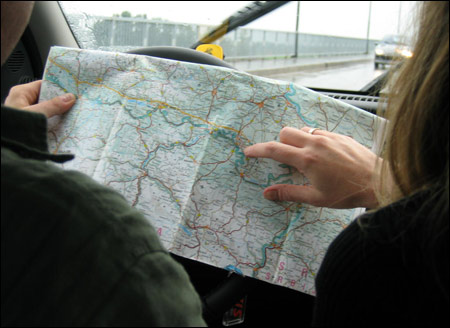‘Lost Highway Expedition Symposium’ at MIT; ‘Inspired by China’ at the Peabody Essex
In August 2006, in a spirit of shared purpose that could serve as a brave new model for political activism, more than 200 artists, architects, and assorted citizens of the world traversed the former Yugoslavia’s former Highway of Brotherhood and Unity (lately referred to as the “Highway of Post Brotherhood and Non Unity”), exploring the cultural and urban landscape of nine cities in the Western Balkans as an experimental, temporary society. The trek, called the “Lost Highway Expedition,” was initiated by two international cultural collaboratives, the School of Missing Studies and Centrala, Foundation for Future Cities, that were interested in seeing what new projects, artworks, architecture, and networks could be generated by sending a swarm of thoughtful folks along a road created in the 1960s to unite the many nationalities that once constituted Yugoslavia.

Meg Rotzel, Road Map (crossing borders in the Balkans)
|
Questions of what has gone missing and what can be found — of utopia and ideology, of identity and connection — are all raised, and local participant, artist, and Berwick Research Institute director Meg Rotzel opens them up for discussion in a two-day “Lost Highway Expedition Symposium” at MIT’s Center for Advanced Visual Studies (CAVS) on October 26 and 27, with an accompanying exhibition of photos, video, and other documentation of the expedition provided by participants from around the world. Rotzel in her press release explains that “the Lost Highway Expedition did not set out to reconstruct the highway built to unite Yugoslavia, or to critique the economic ambitions and political dimensions of today’s highways in the region. Rather the LHE strove to make a third, non-physical infrastructure to link different thoughts and culture, and generate the importance of shared meanings for the future.”
A collaborative spirit also fuels “Inspired by China: Contemporary Furnituremakers Explore Chinese Traditions,” which opens at the Peabody Essex Museum October 28. The exhibition grew out of a three-day workshop held at PEM in June 2005, when curators Nancy Berliner and Ned Cooke invited 22 contemporary studio-furniture makers from the US, Canada, and China to come together to examine and respond to more than 40 significant pieces of antique Chinese furniture. Artists including Judy McKie (Cambridge), Gordon Peteran (Toronto), and Ai Weiwei and Tian Jiaqing (both Beijing) have channeled the ancient objects and produced new works. “Inspired by China” will feature 29 examples of ancient furniture side by side with 28 new pieces. A catalogue with essays by Berliner and Cooke accompanies the show, so you can savor the details and learn more about the history of the art form.
“Lost Highway Expedition Symposium” at MIT’s Center for Advanced Visual Studies, 265 Mass Ave, third floor, Cambridge | October 26-27 | 617.253.4415 | “Inspired by China: Contemporary Furnituremakers Explore Chinese Traditions” at Peabody Essex Museum, East India Square, Salem | October 28–March 4 | 866.745.1876
ADVERTISEMENT
 |
On the Web
MIT’s Center for Advanced Visual Studies: //cavs.mit.edu
Peabody Essex Museum: //www.pem.org